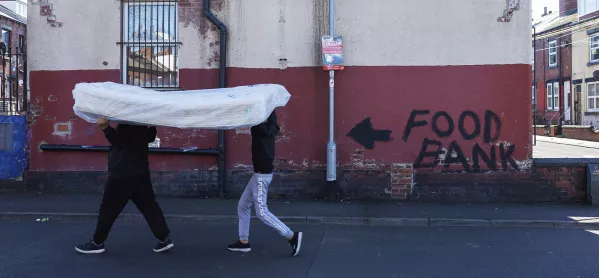Impact of education’s anti-poverty measures unclear, report finds

There is limited information about the impact of anti-poverty measures in schools and other local authority services, a new Audit Scotland report has indicated.
More planning is needed to address child poverty rates that have increased in Scotland since targets were set in 2017, the Tackling Child Poverty report also says.
Audit Scotland’s report says more than a quarter of children in Scotland were living in poverty before the pandemic and that the cost-of-living crisis will make the situation worse.
It says that policies and spending remain more focused on helping children out of poverty than on long-term measures to prevent it.
One of the report’s “key messages” reads: “It is not possible to assess the success of the Scottish government’s first four-year plan to reduce child poverty, launched in 2018, [as it] did not set out what impact the plan was expected to have on levels of child poverty. And the impact of Covid-19 on data collection means data on child poverty is only available up to 2019-20, the halfway point in the four-year plan.”
Measures in the 2018-2022 child poverty plan included a higher school clothing grant across Scotland, money towards support for children experiencing “food insecurity” during school holidays, and extra support for afterschool childcare.
In 2017, the Scottish Parliament set statutory targets for the Scottish government to significantly reduce four key indicators of child poverty by 2023-24, and then again by 2030-31.
The most commonly used indicator, relative child poverty, increased from an average of 21 per cent across 2011-14 to 24 per cent across 2017-20.
In 2019-20, before Covid-19, according to the latest single year of data available, 260,000 children (26 per cent) were living in poverty.
Problems with data collection during the pandemic meant figures for 2020-21 were not published. The target for 2023-24 is for relative child poverty to fall to 18 per cent.
The report recommends consistent use of a range of child poverty indicators to reflect the impact of cost-of-living increases.
Audit Scotland notes that 10 years ago the Christie Commission recommended that the Scottish government and councils shift more focus to the prevention of poverty.
- Also this week: How entrenched are poverty and the attainment gap in Scotland?
- Related: 5 key changes for the Scottish Attainment Challenge to work
- Quick read: Study calls for more tutoring to close attainment gap
- News: Poorer pupils ‘missing out on support due to old data’
The report also advises that initiatives such as the Scottish Attainment Challenge are not expected to have a direct impact on existing targets to reduce child poverty. Instead, they aim to “secure better lifelong outcomes for children and young people and prevent them becoming parents of children in poverty in the future”.
Stephen Boyle, auditor general for Scotland, said: “Poverty affects every aspect of a child’s wellbeing and life chances and has wider implications for society.
“The Scottish government needs to work with its partners to quickly set out the detail of how the second child poverty plan will be delivered, monitored and evaluated.
“Government policy takes time to have an impact on child poverty and so it is essential ministers also act now to set out options for reaching their long-term targets in 2030.”
William Moyes, chair of the Accounts Commission, said: “Councils have a key role to play in tackling child poverty through measures such as housing, education, childcare and employability. But there is limited information available across councils about what they are doing and its impact.
“Better collection and sharing of information about councils’ child poverty work will help support learning and improvement across Scotland.”
A Scottish government spokesperson said: “Tackling child poverty is a national mission.
“We invested an estimated £8.5 billion in supporting low-income households between 2018-22, of which £3.3 billion directly benefited children.”
The spokesperson added: “Our second tackling child poverty delivery plan, ‘Best Start, Bright Futures’, sets out our actions to tackle child poverty still further, including our focus on long-term parental employment support, increased social security, and measures to reduce household costs.
“This includes increasing the Scottish Child Payment to £25 per eligible child per week from 14 November, a 150 per cent increase within eight months, with the game-changing anti-poverty benefit also opening to applications for eligible under-16s from that date.”
Scottish Conservative MSP Miles Briggs said: “Audit Scotland has delivered a damning, but fully justified, criticism of the SNP government’s dismal record on child poverty.
“They point out that levels of child poverty have risen since SNP ministers set targets in 2017, and highlight the lack of long-term measures to prevent it and the need for more joint planning between the Scottish government and local councils.”
He added: “If the SNP’s latest child poverty plan is to have any chance of success, they must reverse years of local government funding cuts and give Scotland’s councils the resources required to tackle this issue.”
You need a Tes subscription to read this article
Subscribe now to read this article and get other subscriber-only content:
- Unlimited access to all Tes magazine content
- Exclusive subscriber-only stories
- Award-winning email newsletters
Already a subscriber? Log in
You need a subscription to read this article
Subscribe now to read this article and get other subscriber-only content, including:
- Unlimited access to all Tes magazine content
- Exclusive subscriber-only stories
- Award-winning email newsletters
topics in this article



